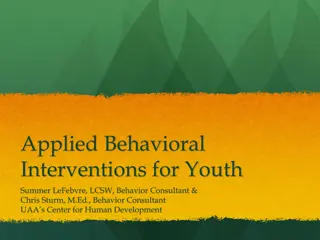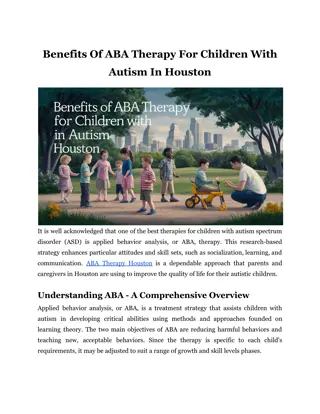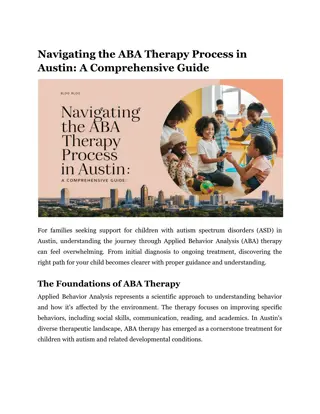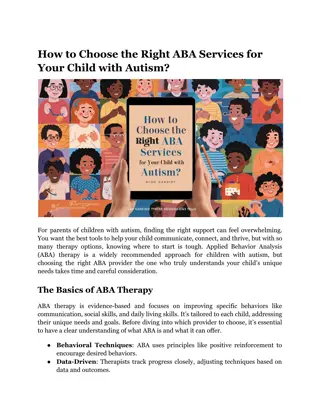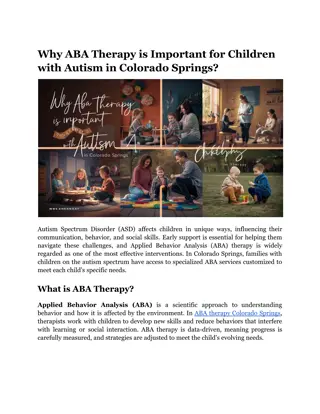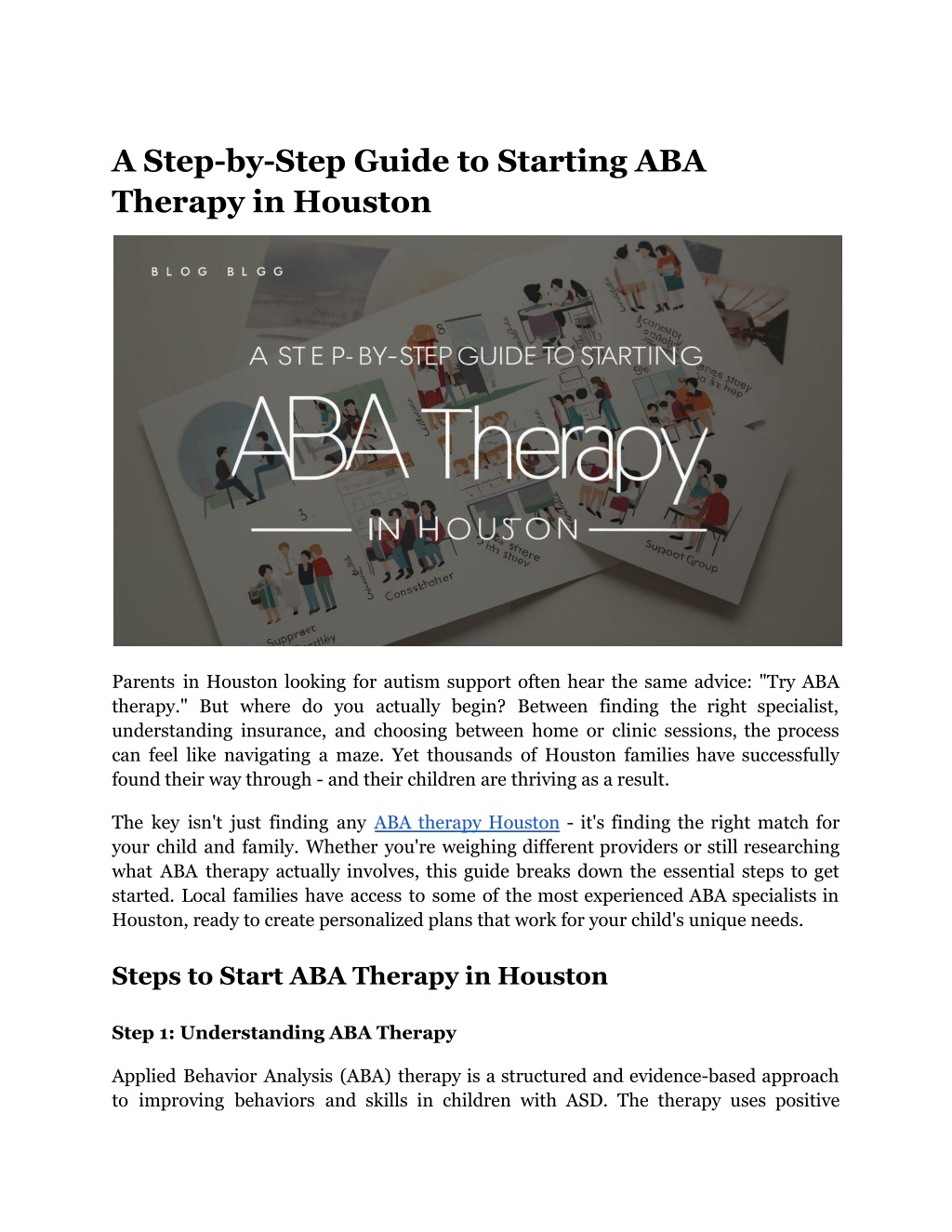
A Step-by-Step Guide to Starting ABA Therapy in Houston
Looking to start ABA therapy in Houston? Our simple guide walks you through each step to ensure the best care for your child with autism.n
Download Presentation

Please find below an Image/Link to download the presentation.
The content on the website is provided AS IS for your information and personal use only. It may not be sold, licensed, or shared on other websites without obtaining consent from the author. Download presentation by click this link. If you encounter any issues during the download, it is possible that the publisher has removed the file from their server.
E N D
Presentation Transcript
A Step-by-Step Guide to Starting ABA Therapy in Houston Parents in Houston looking for autism support often hear the same advice: "Try ABA therapy." But where do you actually begin? Between finding the right specialist, understanding insurance, and choosing between home or clinic sessions, the process can feel like navigating a maze. Yet thousands of Houston families have successfully found their way through - and their children are thriving as a result. The key isn't just finding any ABA therapy Houston - it's finding the right match for your child and family. Whether you're weighing different providers or still researching what ABA therapy actually involves, this guide breaks down the essential steps to get started. Local families have access to some of the most experienced ABA specialists in Houston, ready to create personalized plans that work for your child's unique needs. Steps to Start ABA Therapy in Houston Step 1: Understanding ABA Therapy Applied Behavior Analysis (ABA) therapy is a structured and evidence-based approach to improving behaviors and skills in children with ASD. The therapy uses positive
reinforcement to encourage desirable behaviors while reducing problematic ones. ABA therapy is tailored to each child, focusing on areas such as communication, social interaction, and adaptive skills. ABA therapy of Houston is known for its individualized programs that cater to the specific needs of children and their families. Whether provided in a clinic, school, or home setting, this therapy has shown proven results in helping children reach developmental milestones. Key Questions to Consider: What behaviors or skills would you like your child to improve? Are you looking for an in-home, clinic-based, or hybrid approach? How much time can your family commit to therapy sessions? Step 2: Identifying Your Child s Needs Every child is different, and understanding their specific challenges and strengths is crucial before beginning therapy. Observe your child s behavior and take note of areas where they struggle, such as communication, social interaction, or adaptability. Speak to teachers, caregivers, or pediatricians who interact with your child regularly. Get a formal diagnosis if you haven t already. This is often required to access ABA therapy Houston TX services. Step 3: Researching ABA Providers in Houston Houston offers a wide range of ABA providers, but not all will be the right fit for your child. Research thoroughly to find a provider that matches your family s needs and values. Key Factors to Consider: Credentials: Ensure the provider employs Board Certified Behavior Analysts (BCBAs) and qualified Registered Behavior Technicians (RBTs). Location: Some families prefer in-home therapy, while others may opt for clinic-based sessions. Many providers in ABA therapy Houston offer both options. Reputation: Read reviews, ask for references, and check online ratings. A strong reputation for success in ABA therapy can be reassuring.
Specialization: Check if the provider has experience working with children with challenges similar to your child s. Parent Involvement: Providers that encourage family collaboration often achieve better results. Step 4: Consulting with the Provider After narrowing down your options, meet with potential providers to determine if they re the right fit for your child and family. A consultation offers the opportunity to ask questions and learn about their approach to therapy. Important Discussion Points: Initial Assessment: How will the provider evaluate your child s current abilities and challenges? Treatment Goals: What specific goals will the therapy address? Will they involve skills like communication, behavior regulation, or academic support? Parental Involvement: Ask about parent training or strategies you can use at home to reinforce therapy goals. Monitoring Progress: How does the provider track and share your child s progress over time? Visiting the clinic during the consultation can also give you a sense of whether the environment is welcoming and well-suited for your child. Step 5: Developing a Customized Treatment Plan A cornerstone of ABA therapy is its individualized approach. After assessment, the provider will create a treatment plan tailored to your child s needs. What a Treatment Plan Includes: Baseline Assessments: Identifies current abilities and challenges. Goals and Objectives: Outlines what the therapy aims to achieve, such as improving communication or reducing disruptive behaviors. Strategies: Specifies how goals will be addressed through reinforcement, task analysis, or other techniques. Timeline: Includes a schedule for sessions and projected milestones. Step 6: Preparing for the First Session
Starting therapy may bring excitement and uncertainty. Preparing your child and family helps ensure a smooth transition into the first session. Steps to Prepare: Talk to Your Child: Explain therapy in simple, positive terms. For example, You ll be working with someone who will teach you new ways to play and talk. Familiarize Them with the Therapist: If possible, schedule an introductory meeting or share pictures of the therapist to build familiarity. Create a Routine: Set a consistent schedule for therapy sessions to help your child adjust. Consistency is key for effective ABA therapy of Houston. Provide Comfort Items: If your child has sensory sensitivities, pack items like fidget toys, headphones, or a favorite snack for their session. Step 7: Actively Participating in Therapy Parents and caregivers play a vital role in the success of ABA therapy. Active involvement ensures that progress made during sessions is reinforced at home. Ways to Stay Engaged: Participate in Parent Training: Many providers offer training to help parents implement ABA techniques in daily routines. Communicate Regularly: Stay in touch with the therapist to discuss challenges, milestones, and adjustments to the treatment plan. Practice at Home: Incorporate therapy strategies into family activities, such as reinforcing positive behaviors during playtime or mealtime. Your involvement demonstrates to your child that therapy is a collaborative effort, strengthening their motivation and trust in the process. Takeaway Houston s diverse population and wealth of resources make it an ideal city for families seeking effective autism treatment. The city is home to top-notch providers of ABA therapy Houston, offering a variety of therapy models to suit different needs. Additionally, Houston s active autism networking, support, and additional resources, enhancing the therapy experience. community provides opportunities for Illuminate ABA Therapy understands that every child s journey is unique. As a trusted provider of ABA therapy Houston TX, we specialize in creating personalized,
data-driven programs tailored to your childs needs. Our compassionate team is committed to empowering families and fostering growth that lasts. Ready to take the first step toward meaningful progress? Contact Illuminate ABA Therapy today and let s work together to brighten your child s future. Site Article: A Step-by-Step Guide to Starting ABA Therapy in Houston















